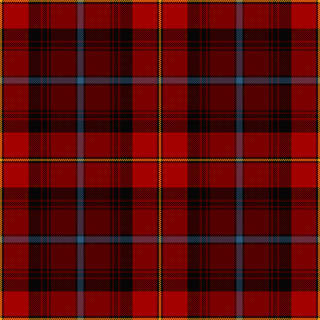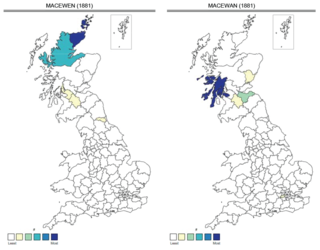McCunn is a surname, originating in Scotland but now widespread in many countries across the world.
McCunn is a surname, originating in Scotland but now widespread in many countries across the world.
The surname is probably a variant of 'McCune', the Anglicised form of 'MacEoghainn'. The personal name 'Eoghain' is a Gaelic form of the Latin 'Eugenius', meaning 'noble', borne by a third-century bishop and martyr. Another theory suggests McCunn as a variant of 'McKeown', which comes from the Celtic 'Mac Eoin' ('Eoin' being the Irish form of John).
The first recorded bearer of the name was Gilcrist McKwnne, circa 1370, in the Calendar of the Laing Charters during the reign of King David II of Scotland. The surname was introduced to Ulster by Scottish settlers during the plantation of the province and later many McCunns emigrated during the Great Famine of Ireland. Since then, the McCunn family has spread throughout the world particularly to North America.

Akins is a Scottish surname and northern Irish family name.
McCune is a surname. Notable people with the surname include:
McKeon and MacKeon are Irish surnames originating both from the Gaelic Mac Eoghain and Mac Eoin, which are pronounced identically. Other variants in English include MacEoin and McKeown. Notable people with the name include:
McKeown or MacKeown is an Irish surname. it originates from two distinct, but similar Irish names: Mac Eoghain and Mac Eoin, which are pronounced identically: /mək ˈow ən/ or "McOwen". The surnames are associated with the Mac Eoin Bissett family. A family who arrived in the Irish Glens of Antrim in the 13th century AD with John Bissett. The family settled in the region with other Anglo-Norman families, marrying into local Gaelic families, adopting the Gaelic culture, laws, language and finding themselves totally assimilated into Irish life.
McManus is an Irish surname. It is derived from the Irish Gaelic "Mac Mághnais", in modern Irish "McMaghnuis" which means "Son of Magnus". Its earlier origin is from the Latin "magnus", meaning "great". The Normans used it to honour Charlemagne (742–814), as Carolus Magnus. Variant spellings of the name include MacManus, Manus and MacManners. The English form, Moyne, is also found in Ulster. In Scotland it is a sept of Clan Colquhoun.
Eoin is a masculine Irish-language given name. The Scottish Gaelic equivalent is Eòin and both are closely related to the Welsh Ioan. It is also cognate with the Irish Seán and English John. In the Irish language, it is the name used for all Biblical figures known as John in English, including John the Baptist and John the Apostle.
Macalister, MacAlister, MacAllister and their variants are forms of a Gaelic surname which means 'son of Alisdair'. The name originated in Scotland and belonged to a branch of the Clan Donald; they became an independent clan in 1493. From about the thirteenth century, MacAlisters were settling in the Glens of Northern Ireland, and they became numerous there.
McNamee is a surname of Irish origin. The original Gaelic version, Mac Conmidhe means "Son of the hound of Meath".
McIvor and MacIvor are anglicised forms of the Irish and Scottish Gaelic Mac Íomhair, meaning "son of Íomhar". Other variants McKeever and McIver.

The surname McGeachie is an Irish and a Scottish surname. In ancient times the family name in Gaelic was Mac or Mag Eachaidh.
Mac Amhalghaidh is an Irish masculine surname. The name translates into English as "son of Amhalghadh". The surname originated as a patronym, however it no longer refers to the actual name of the bearer's father. The form of the surname for unmarried females is Nic Amhalghaidh. The forms for married females are Bean Mhic Amhalghaidh and Mhic Amhalghaidh. The Irish Mac Amhalghaidh has numerous Anglicised forms. The surname has been borne by at least one notable Irish family.
McCown is a Goidelic surname with several possible etymological origins.

McCandlish (, mik-CAND-lish is Scottish surname, derived from Scottish Gaelic and Middle Irish Mac Cuindlis, meaning 'son of Cuindleas', an Old Irish given name of uncertain meaning.
Cowan is a surname of both Scottish-Irish and English origins.
The Gaelic surname Mac Suibhne is a patronymic form of Suibhne and means "son of Suibhne". The personal name Suibhne means "pleasant".
McClay is a Scottish surname. It is derived from Gaelic Mac an Léigh, or possibly a Highland adaption of the Irish Gaelic Mac Duinnshléibhe where the Scots aspirated the “D” and then dropped the final “e” from the Irish language form of the name.
McKone is an Anglicised Irish surname McKeon. Notable people with the name include:
McMenamin is an Irish surname. In Gaelic it is rendered, Mac Meanman, meaning 'son of Meanma' a name meaning courageous or high spirited. It originated in County Donegal in the 13th century. The first written mention of the name is in 1303 in the 'Annals of Loch Cé' which records the deaths of Donnchadh Mac Meanman and Aedh Mac Meanman, grandsons of the Lector O'Domnhaill, the chieftain of Fanad, during a dynastic struggle within the Cenél Conaill. The McMenamins are a branch of the O'Donnells of Tyrconnell (Donegal) and are part of the Sil Lugdach, descendants of Lugaid mac Sétnai, the great-grandson of Conall Gulban. Like many discarded branches of noble families, the McMenamins sought advancement in the church evidenced by numerous mentions of McMenamin prelates in papal letters from the late 1300s to the late 1400s. They were supplanted in their home territory of Fanad by the Sweeneys and over the centuries became more distantly related to the royal line of the Cenél Conaill. One scholar describes the family as "...a discarded branch of the O'Donnell dynasty"
McCandless is a Gaelic surname, both Irish (northern) and occasionally Scottish (south-western). It is derived from the Middle Irish Mac Cuindlis meaning 'son of Cuindleas', an Old Irish given name of uncertain meaning.

The Scottish surname MacEwen derives from the Old Gaelic Mac Eoghainn, meaning 'the son of Eoghann'. The name is found today in both Scotland and Northern Ireland. Because it was widely used before its spelling was standardised, the modern name has several common variations.